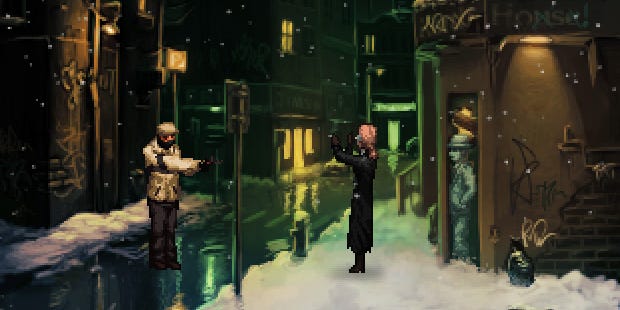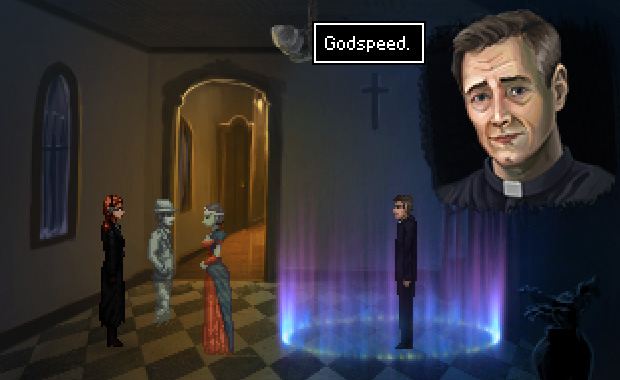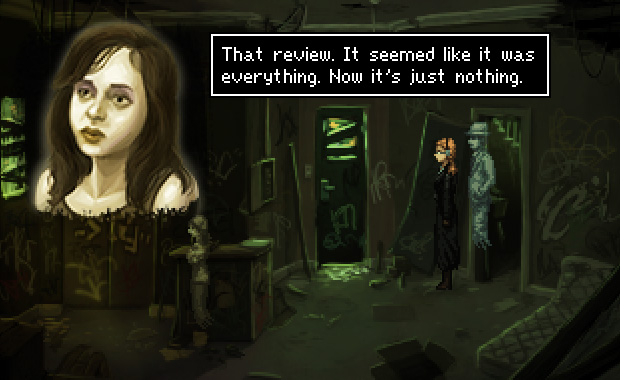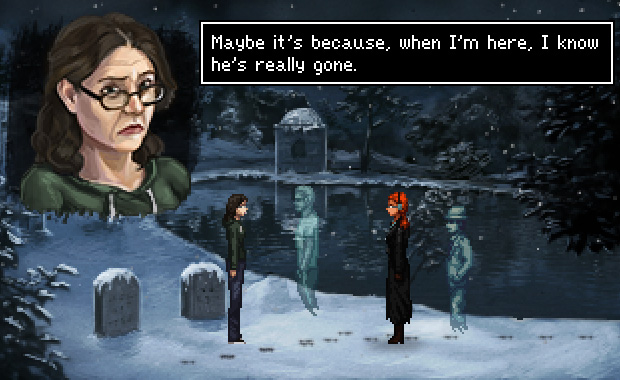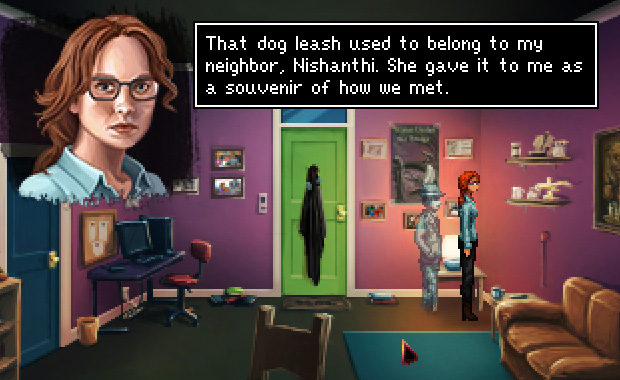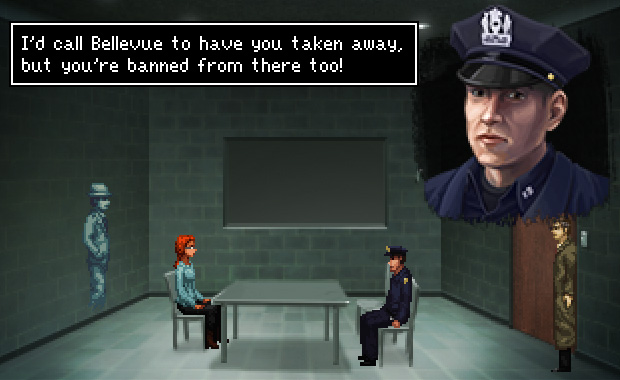Wot I Think: The Blackwell Epiphany
Mallone in the dark
Dave Gilbert's Blackwell Legacy series finally draws a veil over itself today with its final chapter, The Blackwell Epiphany. But does even New York's unluckiest and most underpaid medium stand a ghost of a chance of ending things on a high in this spirited finale? Here's Wot I Think...
There's little harder to write than a good ending. For every Breaking Bad, there's a Lost, a Dexter, a Mass Effect 3. It has to both raise the stakes to the point that nothing else could hope to be as fitting, to add closure after years of investment in the story and characters, and - arguably hardest of all - to stay true to the reasons that made the world give a damn about that closure in the first place.
The Blackwell Epiphany isn't a good ending for the Blackwell series. It's pretty much the perfect ending, both wrapping up and nailing a series that's been going from strength to strength since it first appeared way back in 2006. It's a testament to just how far both Wadjet Eye and creator Dave Gilbert's writing have have come since the clever-but-janky Blackwell Legacy, excellent Unbound, slightly stumbling Convergence, and the confident, fully formed Deception from - gosh, 2011? Really? It doesn't seem that long, not least because of how easy it is to slip into new adventures with awkward psychopomp Rosa Blackwell and her ghost partner Joey. I'm going to miss them.
But we probably shouldn't get into the ending this early, should we? No. Rewind...
While it would technically be possible to jump into the series with Epiphany, I wouldn't recommend doing so. It's the best instalment of the series so far, and does for the most part tell a standalone story - Rosa's now fully embraced quest to find trapped spirits in New York and help them to move on taking a serious turn for the dark when their souls begin getting ripped apart in front of her face. The investigation soon ends up being deeply rooted in the series' overall myth arc though, with the return of Madeline, many answers to things have been hanging over the series since the start, and a number of plot points that are only going to ring true having followed Rosa's journey so far - particularly one major thing in the ending that's either going to come across as heartwarming or utter bullshit depending entirely on whether or not you played one of the previous games.
Until the big plot kicks in, things are business as usual for the series - find spook, find spook's problem, solve it as best as it can be solved, then escort the newly-aware soul to whatever waits beyond the big swirly vortex thing in the sky. It is for the best that Epiphany is drawing a line under the series at this point, as the basic mechanics here have become more than a little routine (to the point that Rosa is no longer knocked on her ass every time), but they stories are inventive and well written as ever - the twist for a seemingly happy prostitute working for New York's most amiable pimp being especially interesting, and the overall mystery once revealed both effective and clever.
This is not however a surprise. I've praised Gilbert many times over the years for his writing chops, and still maintain that he's one of the best working in the field right now. Epiphany shows that yet again, not simply tying up the big plot points with enviable deftness, but retaining the series' compassionate core even as it draws to a close. Each vignette brings a completely different vibe to things, managing to be bitter without descending into schmaltzy manipulation even when dealing with magnets for that kind of thing - a little girl's ghost for instance hitting Rosa and Joey harder than others, but not for the most part treated as all that special. Death is unfair. They know that. They accept that. The real kick comes primarily from the bigger threat at play, and a race to get her 'safe' before whatever is destroying souls can take her death as easily as it apparently took her life.
It's difficult to quite convey exactly how the Blackwell attitude differs from most games, but I've come to think of it like this - that typically in this genre, the focus will be on the villain - on punishing their transgressions, with saving people from them a fringe benefit unless they're a friend or love interest or otherwise 'important' to the character already. Blackwell takes a much more compassionate approach, with Rosa and Joey's time spent with life's casualties pushing them to throw down with the greatest of reluctance (not least because she's about seven stone when soaking wet and his only ghost power is blowing on things a little) and only in the name of protecting people. It's a series about the victims first, and heroism... well, a look in Rosa's inbox makes it clear what a thankless task she's inherited, even if her character growth over the series does mean she's ultimately better off for it.
The bigger picture here doesn't change that, because - and I'm being careful to avoid spoilers here - it keeps the same philosophy in mind. Epiphany's stakes, once revealed, are huge, but it doesn't get so enthusiastic about that that it loses its footing. Its big reveals are effective not simply because they've been foreshadowed or aren't contradicted by anything in canon, but because they're rooted in the characters first and the desire to end on a splashy finale second. The ending even manages to do some subtle repair work, taking a plot point that Gilbert has long regretted (the madness Rosa faces if she doesn't do her job) and serving up a retcon that has no trouble passing for a reveal.
In short, when I say that the Blackwell series has great writing, I'm not simply talking about the individual lines and bits of snark... though they're all good... but the sheer craft underpinning it all. The biggest and most seductive trick of which of course is making it all seem effortless. It's also packed with fantastic little details, like Joey taking time out to show up and comment on Rosa stamping around in the snow during one scene where she gets trapped outside without her coat for a bit, or that Joey talking to Rosa about a subject gets a different dialogue exchange than if Rosa had talked to Joey about it - the same basic information usually, but filtered through their own personalities. Talking about another medium the duo encounter for instance, Rosa focuses on the man, Joey on his spirit guide. Small detail, sure. But small details make for big piles.
Now, as an actual adventure, Epiphany doesn't distinguish itself as strongly. It's fine, just not too ambitious or exciting. All the puzzles are very easy, with characters oddly willing to stay out of the way even when the strange redhead walks in from the cold and starts messing with their stuff, and most of them boiling down to Rosa asking everyone about everything and Joey occasionally blowing on things she can't swipe on her own. On the plus side, one character finally does what I always demand and bypasses a locked door by hurling a brick through the window. On the other, Rosa has still yet to pick up one of those automated lock pick things that even the main character of Bored To Death worked out he needed for his freelance detective work, and has still yet to try convincing a ghost that they're dead by sticking a hand through them and yelling "LOOK! SEE? SEE?"
But I suppose you can't have everything.
The running disappointment for the series is that ever since it began, it's wanted to explore a more involved form of investigation with a Discworld Noir/Laura Bow type system of clues as inventory objects, only to immediately lose confidence and go back to more standard stuff. Epiphany is no exception here, still keeping notes that can be compared, but then only using it about twice. It also has a bit of a problem with padding during its third act, with the need to keep trekking back to the local police station to have a cop look up clues, despite Rosa having a magical device called 'a phone', and the final two ghost investigations of the series both dragging on a little too long for reveals that only barely involve the main plot and that in the exact same way.
(Were I a cynic, I'd suggest that a possible reason for this is that the half-way point smacks hard of a scene that once had the words "TO BE CONTINUED..." hanging over it like the Sword of Damocles, especially with such a biiiiig gap between games, and a few smaller things like a main character passing the baton to another for little good reason and how quickly the cliffhanger moment ends up being resolved. But that's just a guess. If right, I'm glad we got one big game instead.)
On the production side, Epiphany does itself proud. It's still a low resolution game like the others, but an absolutely gorgeous one. New series artist Ben Chandler knocks it out of the park, not just in terms of raw detail and making good use of not many pixels, but with an exquisite an eye for lighting. His New York is a place of glowing streetlamps, emerald green cityscapes, crunchy snow and warm interiors - to say nothing of excellent character animation - all backed up by top quality effects like the blowing snow and Rosa's footsteps, and solid character portraits. Elsewhere, voices can be a touch shaky at times, but not distractingly so. The music however is superb, its jazzy themes the perfect background to both trudging around the City That Never Sleeps in the most unsocial hours of the night and starting up a detective agency. Should the mood ever strike.
It's been a genuine pleasure watching both Gilbert and his creation evolve over the course of the Blackwell series. Individually, I wouldn't put them up with my favourite adventures - they've been a bit short, a little simplistic in terms of challenge, often a lot rough around the edges - but the series as a whole has more than earned its place. It's the right time to end it though, not only to stop it outstaying its welcome, but because the ideas of 2006 are now very visibly the constraint here - that notes system for instance that would be next to impossible to add to the series at this point, or the old-fashioned TV style episodic narrative in an era of heavy serialisation. Wadjet Eye Games - and the fact that it really is now Wadjet Eye rather than one guy in a cafe with a few contractors via e-mail can't be overstated - has simply out-grown the series that made it.
And, y'know, that's a good thing. Not only does Epiphany enjoy every scrap of that growth, both in terms of design chops and the resources now available to be able to end on the high that Rosa and Joey's success deserves, it finally frees everyone involved to cut the cord and create something new - without the baggage, without the expectations. At least, these specific expectations. After a series like Blackwell, there's going to be plenty more waiting for whatever comes next.
For all the right reasons. I can't wait to see what it is.
